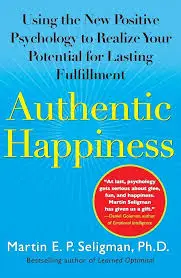
Authentic Happiness
Using the New Positive Psychology to Realize Your Potential for Lasting Fulfillment
Martin E. P. Seligman
Atria Books (2002)
- Social, Spiritual
- Book, Premium Content, Resource Summary
Key Takeaways
- Play to your strengths. Discovering and using your “signature strengths” boosts mood, builds confidence, and can soften FND symptom flare-ups.
- Kindness is medicine. Simple acts that help others reliably lift long-term happiness and calm the nervous system.
- Move for a mood lift. Even gentle exercise releases feel-good chemicals that counter stress and fatigue common in FND.
- Virtues over valuables. Core virtues—wisdom, courage, love, justice, temperance, and spirituality—create deeper, more stable happiness than money, status, or perfect health.
Click to read full summary
The Essentials
Positive psychology flips the old focus on illness by asking, “What makes life worth living?” Seligman shares decades of research showing that happiness is not a lucky accident—it’s a skill set. Happy people live longer, get sick less often, and bounce back faster from setbacks.
The book explains that lasting happiness rests on six universal virtues and the daily use of personal strengths. External factors like wealth or perfect health matter far less than relationships, optimism, and purposeful action. Most important: helping others is the strongest single path to sustained wellbeing.
Why This Matters for FND
Living with FND often means navigating uncertainty, fatigue, and stigma. Authentic Happiness offers evidence-based tools—gratitude exercises, strength spotting, and community service—that fit fluctuating energy levels and empower you to influence your own mood and symptom experience. These strategies support nervous-system regulation, a key goal in FND management.
Resource Qualities
Applicability:
Accessibility:
Evidence-Based:
Practical Value:
The Essentials
For Individuals with FND
Low-Energy Days
- Write down three good things that happened, even if small.
- Send a quick “thank-you” text to someone who helped you today.
Building Long-Term Wellness
- Take the free VIA Strengths Survey (requires registration) and schedule one activity each week that uses a top strength (e.g., creativity, kindness).
- Pair gentle movement—like a five-minute stretch or slow walk—with upbeat music to reinforce positive feelings.
For Care Partners
Supporting Your Loved One
- Spotlight their strengths out loud (“Your perseverance really inspires me”) and invite a shared act of kindness, such as baking for a neighbor.
Caring for Yourself
- Apply the same strengths survey to yourself, and plan a short weekly activity that energizes you—protecting against caregiver burnout.
When This is Most Helpful
- Newly Diagnosed: to build hope and a sense of control.
- During Symptom Flares: as low-effort mood boosters.
- For Ongoing Growth: when seeking deeper purpose and resilience.
This summary is provided for informational purposes only and does not constitute medical, financial, or legal advice. It is not intended to replace professional consultation or treatment. Always consult qualified providers regarding your specific circumstances, symptoms, or questions.
